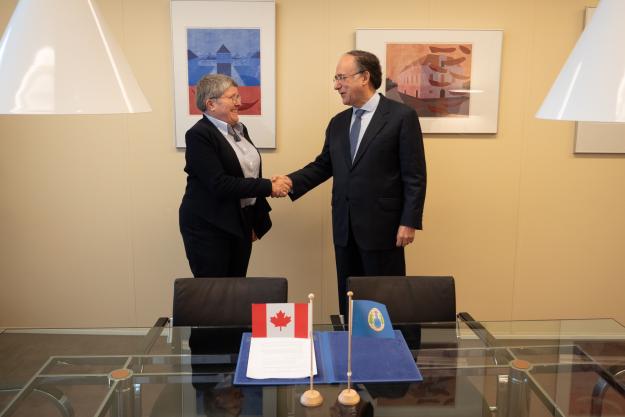
H.E. Ambassador Sabine Nölke, Permanent Representative of Canada to the OPCW (left) and OPCW Director-General, H.E. Mr Fernando Arias (right)
THE HAGUE, Netherlands —29 October 2018 — The Government of Canada will contribute CAD $7.5 million over three years to a special Organisation for the Prohibition of Chemical Weapons (OPCW) Trust Fund to support the project to upgrade the current OPCW Laboratory and Equipment Store through the construction of a new Centre for Chemistry and Technology.
OPCW’s Director-General, H.E. Mr Fernando Arias, signed a Grant Arrangement with the Government of Canada, and then met with H.E. Ambassador Sabine Nölke, Permanent Representative of Canada to the OPCW.
The Director-General expressed: “I thank both the Government of Canada and Ambassador Nölke for this major contribution to the new OPCW Centre for Chemistry and Technology that will further build the capabilities of our Member States to achieve a world free of chemical weapons.”
Ambassador Nölke remarked: “This contribution to OPCW by Canada’s Weapons Threat Reduction Program demonstrates the value we attach to the Organisation’s critical work as both a scientific and disarmament body. We believe this Centre will be the standard-bearer for excellence, supported by the international community.
“Canada is the 2018 Chair of the G7-led Global Partnership Against the Spread of Weapons and Materials of Mass Destruction, and has prioritised support for the OPCW. The Partnership’s updated chemical security strategic vision now identifies the OPCW as a top priority for support by its 31 member countries, further highlighting Canada’s commitment to meaningful action together.”
The OPCW Laboratory and Equipment Store are central to the effectiveness and integrity of the verification regime of the Chemical Weapons Convention, and they also contribute to the OPCW’s capacity building and international cooperation activities.
A new facility is required to meet the demands of OPCW Member States for increased verification research and capacity-building activities, and for the OPCW to keep pace with developments in science and technology and new chemical weapons threats. The OPCW Technical Secretariat is developing a detailed project plan for the construction of the Centre for Chemistry and Technology, and a Trust Fund for voluntary contributions has been established to secure the required resources for the project.
Canada is a Co-coordinator of the Friends of the Laboratory Group, which is an informal group created to mobilise support for the project among States Parties. Membership of the group is open to all Member States.
The Director-General concluded with an appeal to all Member States in a position to make voluntary contributions to do so. He reiterated that “All contributions, regardless of size, are greatly appreciated”.
Background
The project to build an OPCW Centre for Chemistry and Technology is on-going and seeks to strengthen the OPCW’s Science and Technology capabilities to fully address the real threat of chemical weapons, as well as to support capacity building in OPCW Member States. The current facility will soon no longer be fit-for-purpose due to ageing infrastructure, space constraints, larger workloads, and new missions with new areas of work.
As the implementing body for the Chemical Weapons Convention, the OPCW oversees the global endeavour to permanently and verifiably eliminate chemical weapons. Since the Convention’s entry into force in 1997 – and with its 193 Member States – it is the most successful disarmament treaty eliminating an entire class of weapons of mass destruction.
Over 96% of all chemical weapon stockpiles declared by possessor States have been destroyed under OPCW verification. For its extensive efforts in eliminating chemical weapons, the OPCW received the 2013 Nobel Peace Prize.
